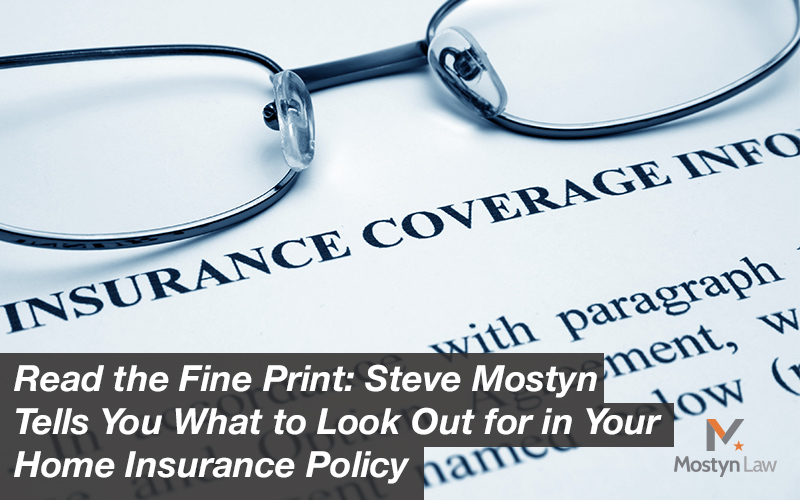There’s no law that says everyone needs to have home insurance, but pretty much everyone does. Most mortgage companies require homeowners to buy coverage, a rule that actually benefits homeowners by forcing them to protect what is likely their largest investment. Even renters need insurance to protect their personal belongings in the event of a fire, flood or another disaster.
Mostyn Law works hard to protect homeowners who have been wronged by their insurance companies, but homeowners have responsibilities, too. They have to understand exactly what’s in their policy when they buy it, and what their coverage will be in a variety of different circumstances.
First question: If disaster strikes what needs to be protected? You can insure any number of things besides your actual dwelling, including, tool sheds, gazebos, and personal property inside the home. You can also make sure your coverage covers “loss of use” expenses that you may incur while repairing your home after a fire or other catastrophe. Hotel bills and the cost of eating out while you’re kitchen-less both qualify. You may also want to consider more specific coverage for risks such as earthquakes or floods.
Insurance policies are divided into what insurance companies refer to as forms. The most common homeowners insurance is the HO-3, which covers 16 specific risks—and those risks aren’t always intuitive. Fire, lightning, riots, explosions, vandalism, theft, and even volcanic eruptions are all included, but earthquakes, floods, landslide or mudslide, nuclear accidents, and sinkholes aren’t. But you can’t stop reading the fine print there. The HO-3 only covers the personal belongings inside your home against 14 risks, rather than 16. If you suffer damage from electrical currents in appliances and wiring or have tears, cracks, or burns in your water heat, air-conditioning or fire sprinkler systems, you’re on your own. Homeowners also have the option of either more or less comprehensive insurance forms—it’s crucial to know exactly what the policy you choose covers.
Renters have a form of their own, the HO-4, which covers the personal property inside the apartment. The landlord’s insurance policy typically covers damage to the actual apartment—the walls, the building, etc. Co-op and condo owners can buy HO-6 policies, which are tailored for people who own a single unit in a multi-family dwelling.
If you use your home for business purposes, you may require additional coverage for business-related claims. If you run a bakery out of your home, for example, don’t count on your homeowner policy to cover you for liability if an employee accidentally cuts himself with a sharp knife or if a kitchen fire destroys your inventory of decorative cake boxes.
In addition to knowing exactly what your policy covers, you also have to know what it doesn’t cover. All policies have exclusions—types of claims they will not cover. A common exclusion is flood insurance. If you live in an area with the potential for flooding, you need to secure coverage separately either through the National Flood Insurance Program (NFIP) or a private insurer.
All policies also set specific limits on coverage. One thing to keep in mind when thinking about these limits, is that your policy should cover the cost of actually rebuilding your home, not just its market value. Market value includes the value of the land and will vary given the fluctuations in the real estate market. For personal belongings and other structures on the property, coverage limits are often expressed as a percentage of the limit on your home coverage. Be thorough as you work with your insurance broker to set these limits on your policy.
Finally, keep in mind that every insurance policy requires the policyholder to put some skin in the game before they will pay for repairs. This is called a deductible. Higher deductibles mean lower monthly premium payments, but higher out-of-pocket costs in the event of disaster. Make sure you can afford to pay the deductible in case of a loss.

